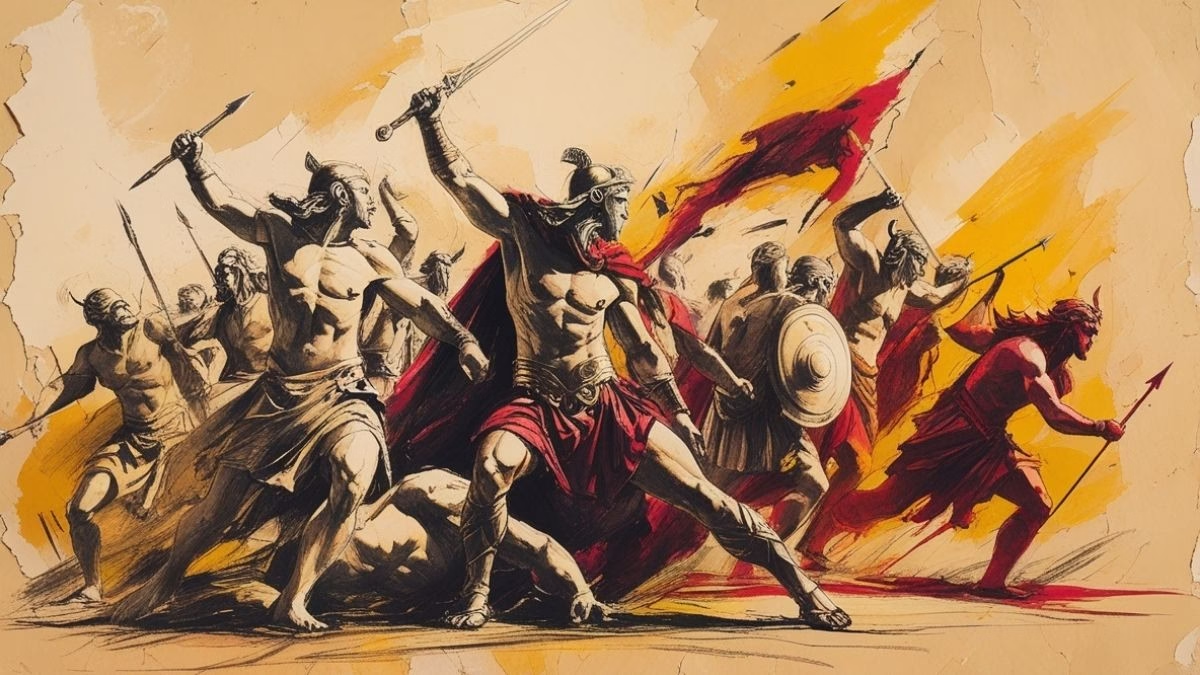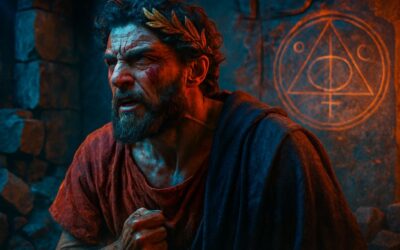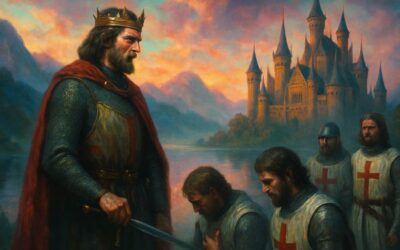Podcast Episode
Introduction
What makes a hero? Is it the strength to face down an army, to be the greatest warrior of your generation, a name whispered in awe on the battlefield? Or is it something else? Is it the cunning to outwit a monster, the resilience to endure a decade of hardship, the unwavering determination to find your way home against all odds?
For nearly three thousand years, Western literature has been wrestling with these questions, and astonishingly, the blueprint for this entire debate was laid down by one name, a name shrouded in mystery: Homer. In two of the most foundational epics ever composed, the Iliad and the Odyssey, we are given two towering figures, two paragons of heroism who could not be more different.
On one side, you have Achilles. The star of the Iliad. A man who is basically a demigod, the greatest warrior the Greeks have ever seen. He is beautiful, terrifying, and fueled by a rage so profound it dictates the course of a war. His heroism is a blazing fire, a spectacle of martial prowess and a desperate, burning desire for eternal glory.
On the other side, you have Odysseus. The hero of the Odyssey. He’s not the strongest or the fastest. His primary weapon isn’t a spear; it’s his mind. He is the master of tricks, the man of twists and turns, whose ten-year journey home from the Trojan War becomes a masterclass in survival, wit, and sheer, bloody-minded endurance.
So, this is the grand showdown we’re exploring today. We’re going to step onto the blood-soaked plains of Troy and sail the wine-dark seas of the ancient Mediterranean to ask our own burning questions:
Is true heroism found in the explosive, glorious rage of Achilles, or in the patient, cunning resilience of Odysseus? What did the ancient Greeks truly value: strength of arm or strength of mind? How do the gods interfere, meddle, and manipulate the fates of these men, and what does that say about the nature of human achievement? And, most importantly, how have these ancient, larger-than-life characters shaped our own modern definition of what it means to be a hero?
These are not just dusty old stories; they are the very DNA of our storytelling. But remember, what we can cover in a single episode is just the first step on a very long and rewarding road. The Iliad and the Odyssey are vast, complex, and endlessly debatable. Think of this as your summons to adventure, an invitation to pick up these monumental works for yourself, because the deepest knowledge is never found in shortcuts, but in the personal journey of reading and discovery.
So, prepare to weigh the meaning of glory, the price of rage, and the power of a clever plan. We’re about to meet the two men who started it all. This is the tale of Achilles and Odysseus.
The Main Story: Homeric Epics: Themes of Heroism in the Iliad and Odyssey
Alright, let’s get into it. When we talk about Homer, we are talking about the wellspring, the fountainhead from which so much of Western literature flows. The Iliad and the Odyssey are more than just adventure stories; they are complex psychological portraits and philosophical inquiries into what it means to be human, and more specifically, what it means to be a hero. And Homer gives us not one, but two competing models, starting with the ultimate warrior.
Let’s begin on the battlefields of the Trojan War with the Iliad. The Iliad is not actually the story of the entire Trojan War. It doesn’t cover the Trojan Horse or the beginning of the war. Instead, it focuses on a very specific period: a few weeks in the tenth and final year of the siege, and it all revolves around one thing: the rage of Achilles. The very first word of the epic in the original Greek is mēnis, meaning rage, or wrath.
Achilles is the greatest of the Achaeans, the Greek forces. He is the son of a mortal king and a sea-nymph, Thetis, which makes him a demigod. He is impossibly fast, divinely strong, and devastating in battle. His entire life is oriented around the concept of kleos—a crucial Greek idea that translates to “glory” or “renown.” In a world without a strong concept of a happy afterlife, the only true immortality was to have your deeds sung about for generations. Kleos was everything. And Achilles was born for it. There was even a prophecy about him: he could either live a long, happy, anonymous life back home, or he could go to Troy, die young, and achieve eternal kleos. He chose Troy. He chose glory.
So, when the story begins, this glory-seeking machine is suddenly brought to a halt. Not by a Trojan spear, but by his own commander, Agamemnon. In a display of supreme arrogance—what the Greeks called hubris—Agamemnon insults Achilles’s honor by stealing a woman, Briseis, who was his prize of war. For us, this might seem like a petty squabble, but in the honor-based culture of ancient Greece, this was a profound public humiliation. It was a negation of his worth.
And Achilles… well, he loses it. He withdraws from the war, taking his formidable soldiers, the Myrmidons, with him. He sits in his tent and pouts. And without him, the Greek war effort collapses. The Trojans, led by their own great hero, Hector, start pushing the Greeks back to their ships. The Iliad makes it clear: Achilles’s heroism is so immense that his absence is as powerful as his presence.
But his heroism is deeply problematic. It’s selfish. He’s willing to let his comrades die to prove a point about his own honor. It’s only when his beloved companion, Patroclus, wears his armor to rally the troops and is subsequently killed by Hector that Achilles’s rage finds a new, terrifying target.
The grief-stricken Achilles returns to battle, and he is no longer just a soldier; he is a force of nature. The poet describes him as a blazing fire, a whirlwind of death. He slaughters Trojans indiscriminately, his grief manifesting as pure, unadulterated violence. The climax is his duel with Hector. Hector is a different kind of hero—he’s a family man, a defender of his city. He’s relatable. But he stands no chance. Achilles kills him, and in a final, shocking act of desecration, he ties Hector’s body to his chariot and drags it around the walls of Troy, mutilating the corpse.
This is the Achilles model of heroism: unmatched martial prowess, an intense and fragile sense of honor, and a life dedicated to achieving immortal fame through glorious deeds on the battlefield. He is an archetype, a template for the warrior hero. But the poem ends on a somber note, with Achilles finally showing a moment of empathy to Hector’s father, Priam. He achieves his kleos, but he is a broken, tragic figure, a hero defined by his rage and his grief.
Now, let’s leave the grim, dusty plains of Troy and set sail on a tempestuous sea. Let’s talk about the Odyssey. If the Iliad is a tragic war epic, the Odyssey is a sprawling adventure fantasy. And its hero, Odysseus, is a radical departure from Achilles.
The Odyssey tells the story of Odysseus’s ten-year struggle to return home—a concept known as nostos—after the Trojan War ends. While Achilles’s primary virtue was his strength (biē), Odysseus’s is his cunning intelligence, his mētis. He’s often given the epithet “polytropos,” the man of many turns, or many tricks. He is a strategist, a liar, a master of disguise, and a survivor.
Think about his famous encounter with the Cyclops, Polyphemus. Achilles would have charged in, spear first. It would have been a glorious, short, and very unsuccessful fight. Odysseus knows he can’t win with brute force. So, what does he do? He gets the giant drunk, tells him his name is “Nohbdy” (Nobody), and then blinds him with a sharpened stake. When the other Cyclopes ask Polyphemus who is hurting him, he screams, “Nobody is hurting me!” allowing Odysseus and his men to escape. It’s brilliant! It’s heroism through brainpower.
His entire journey is a series of such trials that test his mind and his spirit, not just his physical strength. He has to resist the seductive song of the Sirens by having his men tie him to the mast. He spends seven years as a captive of the beautiful goddess Calypso, who offers him immortality if he’ll stay and be her husband. Think about that. Achilles died for immortality. Odysseus is offered it on a silver platter, and he turns it down. Why? Because his goal isn’t abstract kleos. His goal is concrete: his home, his wife Penelope, and his son Telemachus. His heroism is rooted in his humanity, his connection to his family and his kingdom.
When he finally gets back to Ithaca, he doesn’t announce his return with a trumpet blast. He arrives disguised as an old beggar. He patiently observes, assesses the situation—his home overrun by arrogant suitors trying to marry his wife—and he formulates a plan. The final battle is not a duel on an open field; it’s a calculated, brutal slaughter inside his own locked hall. It’s an act of pest control, a methodical reclaiming of what is his.
So, you see the contrast. Achilles’s story is a sprint—a short, explosive, and glorious life. Odysseus’s story is a marathon—a long, arduous journey of endurance. Achilles’s heroism is external, performed for the world to see and sing about. Odysseus’s heroism is often internal, a battle of wits and willpower. Achilles rejects domestic life for eternal fame. Odysseus rejects eternal life for his domestic home.
These two epics, together, create a foundational dialogue about the nature of heroism. They ask us if it is better to be the strongest or the smartest, to live for public glory or for personal connection. They present two archetypes that have echoed through literature ever since. Every hot-headed action hero who shoots first and asks questions later owes a debt to Achilles. Every clever, resourceful protagonist who thinks their way out of a problem is a descendant of Odysseus. Homer didn’t just give us two great stories; he gave us a timeless personality test for all the heroes who would ever follow.
Focus on Language: Vocabulary and Speaking
That was a whirlwind tour of ancient Greece, wasn’t it? From the battlefield to the high seas. Now, let’s zoom in on some of the language from that discussion. Understanding these specific words and concepts not only unlocks the epics but gives you some incredibly precise and powerful tools for your own English communication.
Let’s start with two of those crucial Greek concepts. The first is kleos. As I said, kleos means glory or renown, specifically the glory earned through great deeds that lives on after your death. It was the ultimate currency for an ancient Greek hero. While you might not be fighting for kleos in your daily life, the concept is very much alive. Think about an athlete who wants to be remembered as the greatest of all time, or a scientist who wants their discovery to be their legacy. That’s a modern form of kleos. You could say, “For many actors, winning an Oscar is the ultimate kleos, cementing their place in film history.” It’s about fame that transcends your own lifetime.
The second Greek word is mētis. I mentioned this was Odysseus’s defining trait. It means cunning intelligence, wisdom, or skill. It’s a blend of being clever, adaptable, and resourceful. It’s “street smarts” elevated to a strategic art form. This is an incredibly useful concept. You could praise a colleague by saying, “She handled that negotiation with incredible mētis, getting us a better deal than we ever expected.” Or you could describe a politician as “a leader who relies more on mētis than on charisma.” It’s the ability to find a clever solution to a complex problem.
Next up, a word I used to describe Agamemnon’s attitude: hubris. Hubris is excessive pride or self-confidence that leads to a character’s downfall. It’s arrogance on a fatal scale. This word is used all the time in English. A CEO who ignores warnings and makes a risky bet that bankrupts the company is guilty of hubris. A politician who believes they are untouchable and breaks the law displays hubris. It’s that specific kind of pride that makes you believe the rules don’t apply to you, right before you trip over them. “His downfall was a classic case of hubris; he thought he was too smart to get caught.”
Let’s talk about the word archetype. I called Achilles the archetype of the warrior hero. An archetype is a perfect or typical example of a particular person or thing; it’s a recurrent symbol or motif in literature, art, or mythology. For example, the wise old wizard, the damsel in distress, the rebel without a cause—these are all archetypes. This word is fantastic for analysis. You could say, “Sherlock Holmes is the archetype of the brilliant, eccentric detective.” It helps you categorize and understand characters and stories by connecting them to a larger pattern.
Another literary term I used was epithet. I mentioned Odysseus’s epithet was “polytropos.” An epithet is an adjective or descriptive phrase expressing a quality or characteristic of the person or thing mentioned, like “Richard the Lionheart” or “Alexander the Great.” In Homer, you get them constantly: “swift-footed Achilles,” “grey-eyed Athena.” We use them in a less formal way today, often humorously. If your friend is always late, you might call him “the ever-tardy Michael.” An epithet is a descriptive nickname that sticks.
Now for some great adjectives. I described Odysseus’s journey as arduous. Arduous means involving or requiring strenuous effort; difficult and tiring. It’s a step up from just “hard.” Climbing Mount Everest is an arduous task. Getting a PhD is an arduous process. It implies not just difficulty, but a long, sustained, draining effort. “They began the arduous task of rebuilding their home after the flood.”
Similarly, I used the word tempestuous to describe the sea. Tempestuous means characterized by strong and turbulent or conflicting emotion, or it can literally mean very stormy. You can have a tempestuous sea, but you can also have a tempestuous relationship—one filled with passion, arguments, and drama. Or a person can have a tempestuous personality. “The band was famous for their brilliant music and their tempestuous relationship with each other.”
Now for a couple of classic idioms derived from these myths. You’ve almost certainly heard the phrase to be a person’s Achilles’ heel. Your Achilles’ heel is your one weakness, a fatal flaw in spite of overall strength. It comes from the myth that Achilles’s mother, Thetis, dipped him in the River Styx to make him invincible, but she held him by his heel, leaving that one spot vulnerable. This is used everywhere. “He’s a brilliant strategist, but his short temper is his Achilles’ heel.” “The company is strong, but its over-reliance on a single product is its Achilles’ heel.”
Another great phrase is a Herculean task. While Hercules isn’t from these specific epics, he’s from the same heroic world. A Herculean task is any job that requires the strength or effort of a Hercules; it means a project of enormous difficulty. “Cleaning the entire house after the party was a Herculean task.” It’s a fantastic, descriptive way to say something is incredibly hard work.
Finally, the word odyssey itself. Thanks to Homer, an odyssey (with a lowercase ‘o’) has come to mean any long, adventurous journey or experience. It doesn’t have to be a literal trip. You could talk about your “intellectual odyssey” through college, or a person’s “spiritual odyssey” to find meaning in their life. “Her memoir details her odyssey from a small town to the world stage.” It implies a journey that is not just long, but transformative.
Speaking Section
So, how can we use this to become better speakers? The key here is comparative analysis and nuanced description.
The entire point of our discussion was comparing Achilles and Odysseus. We didn’t just say, “Achilles is strong and Odysseus is smart.” That’s boring. We used richer language. We said Achilles’s heroism is a blazing fire, while Odysseus’s is a marathon of endurance. We contrasted the pursuit of kleos with the longing for nostos.
This ability to compare and contrast complex ideas is a hallmark of advanced speaking. It shows you can see nuance and complexity.
So, here is your challenge. I want you to choose two people or characters to compare. They could be two leaders from your country, two characters from your favorite movie, two famous artists, or even two friends of yours. The goal is to describe what makes them different, moving beyond simple adjectives.
Your mission is this:
- Record yourself speaking for two to three minutes, comparing your two chosen subjects.
- Use at least three of the new vocabulary words or phrases we discussed. Maybe one is an archetype of a certain personality. Maybe one has a particular Achilles’ heel. Maybe getting them to agree on something is a Herculean task.
- Focus on using comparative language. Don’t just list their qualities. Use phrases like: “Whereas Person A is driven by…, Person B is motivated by…” or “While one represents the ideal of…, the other embodies the spirit of…” or “This stands in stark contrast to…”
The goal isn’t to say one is better than the other, but to explore their differences in a deep and insightful way, just as we did with Achilles and Odysseus. This practice will elevate your ability to discuss complex topics with sophistication and clarity. Give it a shot.
Let’s Discuss
We’ve laid out the cases for two of literature’s greatest heroes. Now it’s your turn to be the judge. The beauty of these epics is that there are no easy answers, only fantastic discussions. Here are a few questions to get you thinking and to spark a conversation in the comments section on our website.
- The Ultimate Hero: Achilles or Odysseus? If you had to choose one to be the ultimate hero, who would it be and why? Is the hero who dies for glory more admirable than the hero who lives by his wits?
- To consider: Think about what virtues you value most. Is it courage in the face of death, or the intelligence and resilience to avoid it? Which hero’s story offers more valuable lessons for living a good life today?
- The Price of Glory. Achilles achieves his kleos, his eternal fame, but at the cost of his life and his humanity, particularly in his treatment of Hector. Is kleos worth such a price?
- To consider: Debate the value of legacy versus the value of a lived life. In our modern world of social media and the pursuit of fame, are we seeing new forms of this dangerous quest for kleos?
- The Role of the Gods. Throughout both epics, the gods of Olympus are constantly interfering—helping their favorites, hindering their enemies. How much of the heroes’ success is their own, and how much is just divine intervention?
- To consider: Does the meddling of the gods diminish the achievements of Achilles and Odysseus? Or does facing the whims of immortal beings make their struggles even more heroic? Think about the role of fate or external circumstances in our own lives.
- Homer’s Women: Penelope vs. Helen. The epics are dominated by men, but powerful female figures are central to the plots. Compare Penelope, the faithful and cunning wife of Odysseus, with Helen of Troy, whose abduction starts the war. What do these two figures tell us about the roles and perceptions of women in ancient Greece?
- To consider: Is Penelope a hero in her own right, using her own form of mētis to fend off the suitors? How does her agency compare to the more passive, though pivotal, role of Helen?
- Are the Homeric Epics Still Relevant? These stories are almost 3,000 years old. Do the themes of honor, rage, homecoming, and heroism in the Iliad and the Odyssey still resonate today, or are they simply historical artifacts?
- To consider: Pinpoint specific examples. Can you see the ghost of Achilles in modern soldiers or athletes? Can you see Odysseus’s resourcefulness in modern entrepreneurs or survivors? Where do you see their archetypes playing out in the 21st century?
I can’t wait to read your perspectives on these questions.
Outro
And so we bring our ship into harbor. From the rage of Achilles to the homecoming of Odysseus, we’ve seen how these two Homeric epics laid the groundwork for a conversation about heroism that continues to this day. They remind us that the greatest stories are not about simple good versus evil, but about complex, flawed, and magnificent humanity.
If you enjoyed this deep dive and want to continue improving your English while exploring fascinating topics, there are a few ways you can become a part of the English Plus ecosystem. You can find transcripts for our episodes, extra learning materials, and our entire back catalog on our website at englishpluspodcast.com.
For an even richer experience, you can unlock all our premium podcast episodes by subscribing to English Plus Premium on Apple Podcasts or by becoming a patron on Patreon. Your support there helps us keep the lights on and continue creating the content you love.
And for those of you who want the complete package, you can also subscribe to our All-Access tier on Patreon. That gives you access to everything—all our podcast series, our language courses, and for those who are interested, a front-row seat to my own creative work, including my music and writing. It’s the ultimate way to learn and to support an independent creator.
Thank you for lending me your ears today. Your time and attention are the most valuable things you can give, and I’m grateful you chose to spend them here. Until next time, keep learning, stay curious, and keep the conversation going.










0 Comments